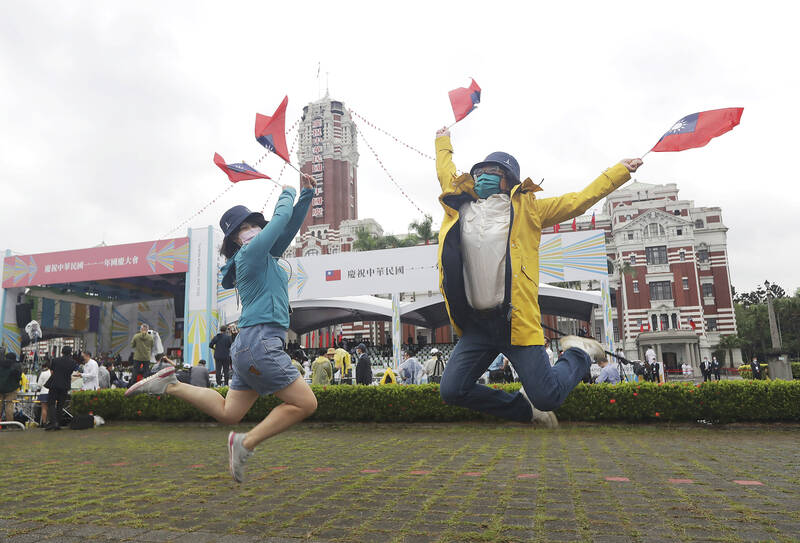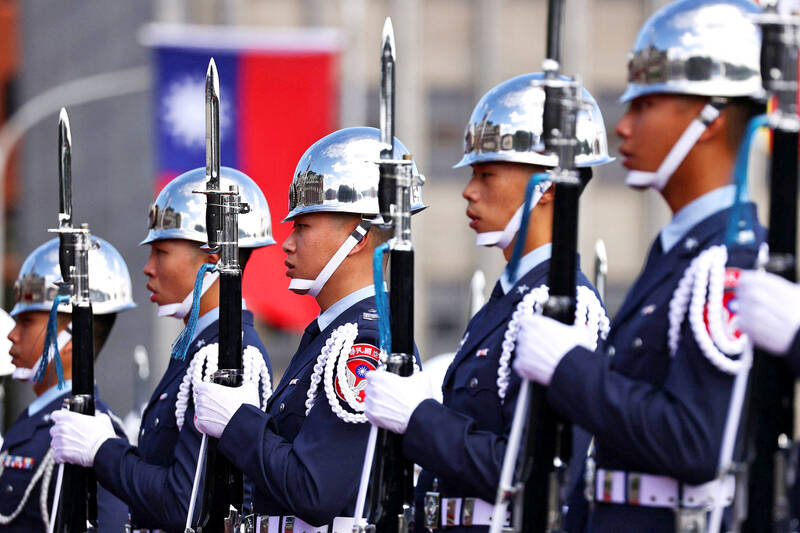For many years in the 1990s I had the joy of working for a consulting firm in Washington DC whose sole client was the prime minister’s office of a major foreign power. Among my responsibilities was covering US energy policy, which meant tracking the climate debacle in the US.
The climate “debate” had some well-defined positions: the scientists and their opposites, anti-science denialists who were largely paid for by fossil fuel firms. Those lines were clear and easy to see. However, there was also a fuzzy “middle,” also close to the fossil fuel industry, that positioned itself as the “reasonable” voice in the center, but who were actually confusionists. Their goals were to sow doubt and delay.
As China militarizes, the debate in the US over what to do about China is shaking out along those lines. There are numerous commentators and observers with a grip on reality, such as Ian Easton, who posted on Twitter recently: “It is no longer a question of if Xi Jinping (習近平) will order the PLA to attack Taiwan. It is now a question of when and how. This threat is like no other.”

Photo: AP
Similarly, in this case the anti-reality denialists are easy to spot: think tankers, Chinese government officials, strange Russian and Chinese assets, obvious people making obviously false arguments that China is not an imperialist state, doesn’t aggress on other nations, it’s all the fault of the perfidious US, all commonplaces of apologetics for Chinese imperialism.
THE CONFUSIONISTS
In between reality and the China denialist extreme lies a gray area inhabited by too many commentators whose focus is on China. Just as with climate confusionists, this rhetoric is positioned as “the sane choice,” “there is still time,” and so on. If read properly, the underlying, plaintive, “but what does this mean for our China?” is clear.

Photo: Reuters
Take Jessica Chen Weiss of Cornell, whose work has been widely circulated in recent weeks, with pieces in Foreign Affairs (“How to Avoid a War Over Taiwan,” Oct. 13) and in the New York Times (“America and China Don’t Need to Knock Each Other Out to Win,” Oct. 19).
Joining Chen Weiss in the Foreign Affairs piece was a cadre of scholars. There were a couple of names I was surprised to see, including that of Bonnie Glaser, director of the Asia program at think tank the German Marshall Fund of the US, and M. Taylor Fravel of MIT.
The Foreign Affairs essay was a classic of confusionist rhetoric, taking apparently reasonable positions, noting China’s militarization, asking both sides to provide “assurances.” But terms such as “mainland” China and Taiwan’s “permanent separation” are clear tells, terminology Chen Weiss has used elsewhere.
Another giveaway: the piece does not clearly delineate the US position on Taiwan. If you don’t make it clear that Taiwan is not part of China under both international law and US policy (and history!), you can get your readers to accept that perhaps China’s position has something for it.
The group argued that deterrence requires signaling both threats and assurances to the target state.
“The assurance requires conveying to the target, in a way that it can trust, that it will not be taken advantage of if it refrains from taking the proscribed action,” they said. Trust? Beijing does not even trust its own citizens, let alone foreign powers opposed to its expansion.
The piece was straight out of 2004, arguing, hilariously, that Taiwan must be prevented from “declaring independence,” though Democratic Progressive Party (DPP) officials have been publicly announcing that Taiwan is an independent state for over two decades now (it’s not independence, which we already have, but recognition, that Taiwan wants).
“Triangular deterrence,” it claims, “has succeeded for over 40 years in keeping the peace across the Taiwan Strait.” No, what kept the peace was the gross disparity in fighting power between the US-Japan-Taiwan alliance and China. It’s not a coincidence that once that disparity disappeared suddenly war looms.
A HISTORY LESSON FOR APOLOGISTS
Any position that is not rooted in this history is broken from the beginning. Indeed, as all China apologetics do, it largely attributes the changes in the cross-strait relationships to US actions and of course, to the Taiwanese for wanting to live in an independent democracy like all the writers of that piece do.
The Foreign Affairs cadre argued that to assure Beijing, Washington has to say “it does not support independence for Taiwan, that it opposes any unilateral change to the status quo by either side and that it will accept any outcome that is peacefully agreed to by mainland [sic] China and Taiwan.”
The writers concede that Washington has long done exactly that. They then argue that Washington has moved away from that in recent years. Yes, of course, because Beijing has not responded positively to 40 years of assurances. D’oh. This has forced US thinkers to call for different policies.
During the whole period of Beijing’s military modernization, Washington followed the policy that the Foreign Affairs cadres tells us we should return to. In fact, we repeated it again and again for decades, like frenzied cartoon characters on looped animation. Look how effective it was in reassuring Beijing. Imagine if we hadn’t been doing that, how big Beijing’s military buildup might have been!
The reason that calls for reassurance are pointless is because (1) no one can trust Beijing’s assurances (see PRC, history of), (2) we did that for decades and it failed miserably and (3) there is no reassurance that Beijing will accept short of actual possession of Taiwan.
Further, deterrence by its very nature undermines any possibility of assurance. Every resource committed to Taiwan’s defense is a resource committed to keeping Beijing from annexing it. It is thus the height of incoherence to call for assurances to Beijing while calling for stronger US alliance links and military investments in East Asia. Choose one, because Beijing is not that stupid.
Indeed, the search for ways to give assurances to China simply hands it leverage over US policy. The Chinese are never expected to give credible assurances to us (the Foreign Affairs piece calls for them, but they require no serious departure from anything Beijing has done, lack concreteness and impose no costs on Beijing. Our China must not be harmed or asked to make real sacrifices).
It’s simple: the US interest is to keep Taiwan out of Beijing’s hands, it wants to avoid a future of constant gray zone warfare across the Pacific with occasional irruptions of outright hot war as China attempts to grab more territory from its neighbors and to expand the reach and position of its insatiable fishing fleets.
For 40 years it was easy to keep Taiwan a de facto independent state. Now it’s hard, and everyone in Taiwan, Japan and the US who has a grip on reality is moving toward the same policy: re-armament. Yesterday. Departures from and variations on this should generally be regarded as forms of denialism.
What is Chen Weiss’ real position? While arguing for “reasonable” positions in recent publications, a couple of weeks ago she tweeted out: “The United States has a strategic interest in the peaceful resolution of differences across the Taiwan Strait, not in Taiwan’s permanent separation or independence.”
Chen Weiss’ position is the same as Xi Jin-ping’s: Taiwan is part of China.
Confusing, isn’t it?
Notes from Central Taiwan is a column written by long-term resident Michael Turton, who provides incisive commentary informed by three decades of living in and writing about his adoptive country. The views expressed here are his own.

In the March 9 edition of the Taipei Times a piece by Ninon Godefroy ran with the headine “The quiet, gentle rhythm of Taiwan.” It started with the line “Taiwan is a small, humble place. There is no Eiffel Tower, no pyramids — no singular attraction that draws the world’s attention.” I laughed out loud at that. This was out of no disrespect for the author or the piece, which made some interesting analogies and good points about how both Din Tai Fung’s and Taiwan Semiconductor Manufacturing Co’s (TSMC, 台積電) meticulous attention to detail and quality are not quite up to

April 21 to April 27 Hsieh Er’s (謝娥) political fortunes were rising fast after she got out of jail and joined the Chinese Nationalist Party (KMT) in December 1945. Not only did she hold key positions in various committees, she was elected the only woman on the Taipei City Council and headed to Nanjing in 1946 as the sole Taiwanese female representative to the National Constituent Assembly. With the support of first lady Soong May-ling (宋美齡), she started the Taipei Women’s Association and Taiwan Provincial Women’s Association, where she

Chinese Nationalist Party (KMT) Chairman Eric Chu (朱立倫) hatched a bold plan to charge forward and seize the initiative when he held a protest in front of the Taipei City Prosecutors’ Office. Though risky, because illegal, its success would help tackle at least six problems facing both himself and the KMT. What he did not see coming was Taipei Mayor Chiang Wan-an (將萬安) tripping him up out of the gate. In spite of Chu being the most consequential and successful KMT chairman since the early 2010s — arguably saving the party from financial ruin and restoring its electoral viability —

It is one of the more remarkable facts of Taiwan history that it was never occupied or claimed by any of the numerous kingdoms of southern China — Han or otherwise — that lay just across the water from it. None of their brilliant ministers ever discovered that Taiwan was a “core interest” of the state whose annexation was “inevitable.” As Paul Kua notes in an excellent monograph laying out how the Portuguese gave Taiwan the name “Formosa,” the first Europeans to express an interest in occupying Taiwan were the Spanish. Tonio Andrade in his seminal work, How Taiwan Became Chinese,